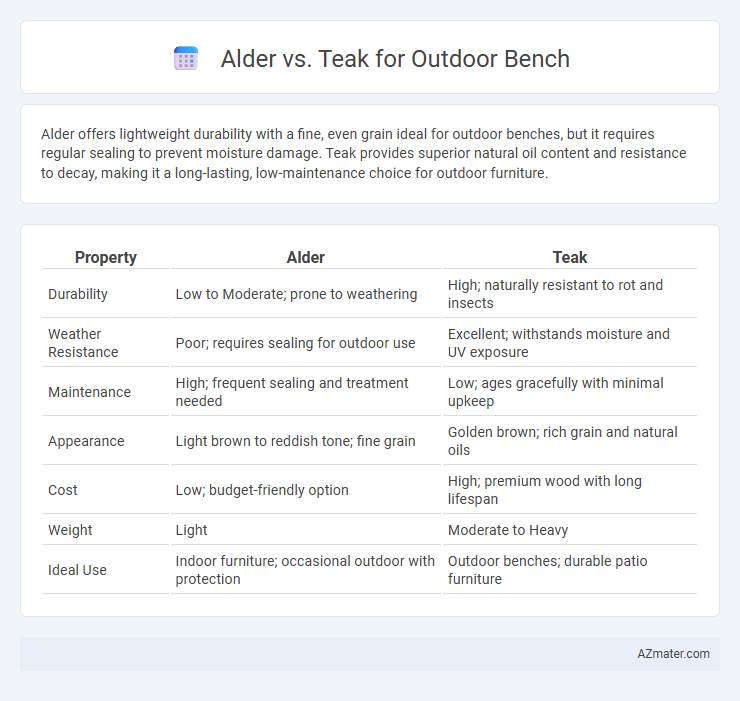Alder offers lightweight durability with a fine, even grain ideal for outdoor benches, but it requires regular sealing to prevent moisture damage. Teak provides superior natural oil content and resistance to decay, making it a long-lasting, low-maintenance choice for outdoor furniture.
Table of Comparison
| Property | Alder | Teak |
|---|---|---|
| Durability | Low to Moderate; prone to weathering | High; naturally resistant to rot and insects |
| Weather Resistance | Poor; requires sealing for outdoor use | Excellent; withstands moisture and UV exposure |
| Maintenance | High; frequent sealing and treatment needed | Low; ages gracefully with minimal upkeep |
| Appearance | Light brown to reddish tone; fine grain | Golden brown; rich grain and natural oils |
| Cost | Low; budget-friendly option | High; premium wood with long lifespan |
| Weight | Light | Moderate to Heavy |
| Ideal Use | Indoor furniture; occasional outdoor with protection | Outdoor benches; durable patio furniture |
Introduction: Choosing the Right Wood for Outdoor Benches
Alder and teak are popular wood choices for outdoor benches, each offering unique benefits suited to different needs. Alder wood is known for its smooth texture and affordability, making it ideal for painted finishes and moderate outdoor use. Teak stands out for its exceptional durability, natural oils, and resistance to decay, making it the preferred option for long-lasting, weather-resistant outdoor furniture.
Overview of Alder and Teak Wood
Alder wood is a soft hardwood known for its fine, straight grain and light brown to reddish hue, making it easy to work with and ideal for indoor furniture but less resistant to outdoor elements. Teak wood, a dense hardwood rich in natural oils and silica, boasts exceptional durability, weather resistance, and a warm golden-brown color that improves with age, making it a premium choice for outdoor furniture like benches. The natural resistance of teak to rot, insects, and moisture significantly surpasses alder, providing longevity and low maintenance in outdoor environments.
Durability and Weather Resistance Comparison
Teak offers superior durability and weather resistance for outdoor benches due to its natural oils that protect against moisture, insects, and decay, lasting decades even in harsh conditions. Alder, while affordable and visually appealing, is softer and lacks the natural oils found in teak, making it more prone to dents, scratches, and weather-related damage over time. Choosing teak ensures long-term structural integrity and low maintenance, whereas alder requires regular sealing and care to withstand outdoor elements.
Maintenance Requirements: Alder vs Teak
Teak requires minimal maintenance due to its natural oils that resist moisture, insects, and decay, making it ideal for outdoor benches exposed to varying weather conditions. Alder demands more frequent upkeep such as regular sealing and staining to protect against moisture damage and UV exposure, as it lacks the inherent weather-resistant properties of teak. Over time, teak develops a desirable silver-gray patina with little intervention, whereas alder is prone to fading and may require more intensive refinishing to maintain its appearance.
Appearance and Aesthetic Qualities
Alder wood exhibits a warm, reddish-brown hue with a smooth, fine grain that offers a rustic yet refined appearance ideal for outdoor benches seeking a natural look. Teak boasts a golden-brown color with rich, oily texture and pronounced grain patterns that enhance durability and provide a luxurious, weather-resistant finish. The high natural oils in teak resist moisture and aging better than alder, making it a premium choice for aesthetic longevity in outdoor settings.
Cost Analysis: Alder vs Teak for Outdoor Furniture
Alder offers a budget-friendly option for outdoor benches, with costs significantly lower than premium hardwoods like teak, making it ideal for cost-conscious projects. Teak, while more expensive upfront due to its natural oils and durability, provides long-term value by resisting rot and reducing maintenance expenses. When analyzing cost, consider that alder's lower initial price may incur higher upkeep costs over time, whereas teak's durability often offsets its higher purchase price.
Sustainability and Eco-Friendliness
Alder wood, sourced from sustainably managed forests, offers a lower environmental impact due to its faster growth rate compared to teak. Teak, known for its natural oils and durability, is often harvested from tropical rainforests, raising concerns about deforestation and habitat loss despite certifications like FSC. Choosing alder promotes eco-friendly outdoor benches with less carbon footprint, while teak requires careful sourcing to ensure sustainability and long-term forest conservation.
Workability and Ease of Construction
Alder wood offers superior workability for outdoor bench construction due to its soft texture and consistent grain, making it easier to cut, shape, and sand compared to teak. Teak, while denser and more challenging to work with, provides exceptional natural oils that enhance durability and weather resistance, reducing the need for frequent maintenance. For builders prioritizing ease of construction and smooth finishing, alder is preferable, whereas teak suits projects demanding long-term resilience in harsh outdoor conditions.
Longevity and Performance in Outdoor Settings
Alder wood offers moderate durability but is prone to moisture damage and decay in outdoor settings, making it less suitable for long-term exposure. Teak wood excels in longevity due to its natural oils and dense grain, which provide outstanding resistance to rot, insects, and harsh weather conditions. For outdoor benches, teak ensures superior performance and extended lifespan with minimal maintenance compared to alder.
Conclusion: Which Wood is Best for Your Outdoor Bench?
Teak is the superior choice for outdoor benches due to its natural oils that resist water, decay, and insects, ensuring long-lasting durability with minimal maintenance. Alder, while more affordable and easier to work with, lacks the longevity and weather-resistant properties needed for outdoor use. For a bench that withstands harsh elements and retains its aesthetic appeal over time, teak is the best wood option.

Infographic: Alder vs Teak for Outdoor Bench
 azmater.com
azmater.com